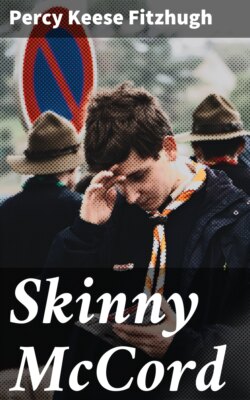Читать книгу Skinny McCord - Percy Keese Fitzhugh - Страница 4
На сайте Литреса книга снята с продажи.
CHAPTER II
SHADOWS
ОглавлениеTable of Contents
Tom, Brent and Uncle Jeb were not the only persons who waited that night for the camp-fire to die. All unknown to each other two boys lingered in the darkness. One was a slim little fellow with big, staring eyes, a queer gnome of a boy, who stole out of the Elks patrol cabin and stood with his gaze fixed on the dying embers, listening and eagerly waiting for the last watchers to withdraw. He intended to steal back alone and search for his precious compass. For this little trinket meant more to him than he had been willing for that hilarious company to believe.
Now that he had at last achieved the glory of a real scout suit he could wear this little appurtenance dangling from his scout belt in the flaunting manner of Pee-wee Harris. In the store at Kingston he had bashfully tried this suit on (to the great amusement of his companion, Curry) and he had looked like a bolster in it. But no size seemed to fit him. Poor Skinny would never look trim. As he waited there in the darkness, watching the last faint glow of the fire, he had not a little the appearance of an hour glass, with his belt drawn so absurdly tight that his clothing seemed to bulge above and below it.
The other boy who waited for the fire to die was not a scout. He sat on a rough bench up at the roadside just where the path led down through the woods into camp. Approaching along this road one reached a sign with an arrow pointing down into the woods and with the words To Temple Camp printed on it. A trail wound down the wooded slope to the sprawling scout community at the lakeside. At this point where the trail left the road stood the old bench and close by it a post surmounted by a huge letter-box where the rural carrier left the camp mail.
The spot was a pleasant loitering place as was evidenced by the many carved initials on the bench and the post. No part of the camp was visible from this spot though sometimes a little glint of silvery water was discoverable through the trees. But at night two distinct glowing areas could be seen from the wayside seat. Many a new scout had been fooled by these. It was one of the popular jokes of camp to take a new arrival up to the road at night, and then send him forth to find the northernmost glow, which was only the reflection of the camp-fire in the distant lake. Even so good a scout as Bert Winton, who was a Vermont Eagle, had gone hiking down into the dark woods in search of this fire and had gone clear around the camp and come out up at the end of the lake where Tenderfoot Cove is, only to see the glow reduced to a little glinting patch on the water.
The boy who was not a scout had come along the road looking for the camp. At Leeds, the nearest village, he had been told where to turn down into the woods. But now that he had reached the spot he hesitated, for the two bright areas down there in the woods told him that the camp people were still about. It was his intention to enter the camp unseen. He was very weary and was not averse to sitting on the bench and waiting. Now and then he glanced furtively up and down the dark road as if fearful that he might be discovered, and once when an auto sped by, throwing a momentary glare over the spot, he cringed and breathed quickly.
He was about sixteen, this boy, and tall of stature with a litheness about him which suggested the cautious stealth of an animal. His eyes were gray and large, but he kept them half closed and used them with a kind of darting agility. When he arose and stepped across the road for a better look at the glowing areas, there was a certain elasticity in his step, a silent springiness, very suggestive of wild life and extraordinarily graceful. He laid his hands against his hips and narrowed his eyes in studious concentration on those distant spots of light. It was a fine, unconscious posture.
The path of least resistance for a boy’s hands at this moment would have been his trousers pockets, but the trousers worn by this boy had no pockets. They were gingham trousers and afforded their wearer not one single carrying facility. This boy had grown used to pocketless trousers and accustomed himself to that picturesque way of standing with his hands against his hips.
For several minutes he gazed steadily at those distant glowing patches. His narrowed eyes became steely in this concentration. A fine, inspiring figure of a scout, baffled and yet resolved, he made as he stood there. Suddenly some little creature of the woodland made a sound in its nightly prowling and the boy turned with lightning rapidity, listening fearfully. Then he resumed his study of the distant patches of light. He was vivisecting them at long distance, comparing the flickering movements one with another.
“I’ll be— Those aren’t two fires,” said he. “There’s only one. The other’s just a reflection. The two of them move alike.”
It was not so bad for a boy who was not a scout. Still, when this boy set about doing a thing he usually succeeded. The very night before he had essayed to do a daring thing, a dreadful thing. And he had succeeded.
